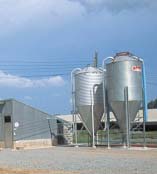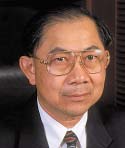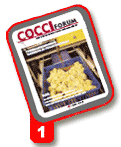COCCI Focus - Kicking the Habit
CP Bangkok produces drug-free birds for Japan
 |
"We are putting more emphasis on vaccination and environmental controls to control disease," he says. "Over the next few years, as we make further improvements to our facilities, we hope to produce all of our birds without drugs."
The change in CP Bangkok's disease- management strategy is driven by several factors:
Changing consumer demand. "We want to help resellers add value to their poultry products, while meeting the changing needs of the consumer," explains CP's Anek Bondoon, a senior vice president.
"Today's consumers know a lot about food safety and are particular about how their food is produced," he adds. "This started in Europe and we're now seeing it throughout the Pacific Rim. We want our supermarket customers and other resellers to be ready to meet the growing demand for natural products."
It appears that CP is on the right track. According to one report by the Mid-America International Agri-Trade Council, a regional trade group in the United States, organic food sales in Japan have increased 20%-30% since the 1980s, with total sales expected to reach US$2.6 billion this year.
The Canada-Japan Trade Council also reports that organic foods are "taking off" in Japan, adding that both Japanese importers and Japanese consumers are increasingly looking for products produced with no chemical or drug additives.
"The Japanese have long had a heightened awareness of and concern about their food supply," the report observes. "In addition, they are attracted by the perceived extra tastiness and nutritional value of organic [foods]."

Denvanich: 'Vaccinating for coccidiosis
is now a better option.'
|
Value-added products. "We look at
our supermarket customers as strategic
partners," explains CP's Somboon
Denvanich, also a senior vice president.
"Our resellers wanted a strategy for
adding value to their products and
meeting the needs of these new markets.
That is the way to become the
market leader. Drug-free birds are helping
our resellers reach that goal and
obtain a premium price on their products."
Better margins. According to
Denvanich, CP gets a premium of 15%
on drug-free poultry. "Finishing time
for a 2-kilo (4.4-pound) bird is 45 days,
or about 3 days more than when we
were using growth promoters and other feed antibiotics," he says.
"Overall our production costs are up
about 10%, but we're getting a 15%
premium."
Producing drug-free birds is also
helping CP Bangkok expand. All of its
drug-free birds are currently imported
by one Japanese buyer, but the company
expects demand to increase significantly
in Japan and other countries
over the next few years.
"We knew that if we wanted to continue
exporting to Japan or expand in
Europe, we had to move in this direction.
We also want to get away from
producing a commodity product,"
Khanti says. "By taking drugs out of the
feed, we give our products added
value."
Advances in vaccine technology.
In the past, CP's biggest obstacle in the
way of drug-free birds was coccidiosis,
which is usually controlled with
ionophorous antibiotics or other chemical
coccidiostats.
"Vaccinating for coccidiosis is now a
better option," Denvanich says. "It
allows us to produce drug-free birds
without sacrificing weight gain, conversion
or profitability. In fact, switching
to vaccination has helped us add more
value to our product."
Dr. Khanti says he was apprehensive
at first about removing the coccidiostat
from starter and grower
rations.
"But the vaccine provides protection
for the life of the bird, so we don't have
to worry about coccidiosis breaks," he
says. "It also solved the problems we
were having with coccidiostat resistance."
The vaccine, Coccivac-B, is a live
oocyst vaccine that protects against the
most economically significant species
of Eimeria causing coccidiosis in broiler
chickens. It is administered to dayold
chicks by a specially designed
spray cabinet that provides uniform
distribution of the vaccine.
The next step for CP is to introduce
coccidiosis vaccination to the other 30
million birds in its system that presently
get antibiotics. "We're not ready to
eliminate all the drugs from those older
contract facilities, but we would like to
try rotating the coccidiosis vaccine with
a coccidiostat to reduce drug usage and
stop resistance patterns," Denvanich
says.
Better facilities and management.
New ways of managing birds are also
helping CP produce drug-free birds
without compromising production.
"When you produce this kind of product,
you have to watch environmental
controls," Denvanich says. "The birds
also require more intensive care during
the first two weeks of age."
Dr. Khanti says birds are placed at a
stocking rate of 12.60-13.50 per square
meter (3.28 square feet) in houses with
evaporative cooling systems. The litter is changed for every flock. The diets of
the drug-free birds have nutrient values
comparable to the other birds in CP's
system.
"But there are no anticoccidials or
growth promoters," he adds. "We use
acidifiers to control gram negative bacteria."
Denvanich says their goal is to produce
all of their birds without anticoccidials
or growth promoters, but he
says this may take a few years.
"Eliminating antibiotics is not something
you can do on every farm," he
says. "It requires a higher level of management
and modern buildings, with
good ventilation and cooling systems."
Source: CocciForum Issue No.1, Schering-Plough Animal Health.







